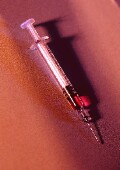
FRIDAY, Jan. 8 (HealthDay News) — Preliminary research suggests that a vaccine could help reduce the risk of a relapse in some people who take the drug Gleevec to treat chronic myeloid leukemia.
“Should this vaccine approach prove to be successful, the ability to get patients off lifelong Gleevec therapy would be a significant advance,” Dr. Hyam Levitsky, a professor of oncology, medicine and urology at the Johns Hopkins Kimmel Cancer Center in Baltimore, said in a news release from the center.
Imatinib mesylate (Gleevec) treats chronic myeloid leukemia, but can leave some cancerous cells behind. They can cause a relapse.
Researchers from the cancer center tested a vaccine on 19 people who had cancerous cells even though they’d taken Gleevec for a year. After about 72 months, the number of cancer cells had declined in 13 people. In seven, the cancer had vanished. Reported side effects of the treatment were relatively rare.
But it’s not clear if the results were actually caused by the vaccine, the researchers said, because of the small number of participants and the lack of comparison with other treatments.
“We want to get rid of every last cancer cell in the body,” Levitsky said, “and using cancer vaccines may be a good way to mop up residual disease.”
The vaccine was made from cancer cells that were blasted with radiation to stop them from being cancerous, the researchers said.
The research, funded by the U.S. National Institutes of Health, was published in the Jan. 1 issue of Clinical Cancer Research.
More information
The U.S. National Cancer Institute has more on Gleevec.

